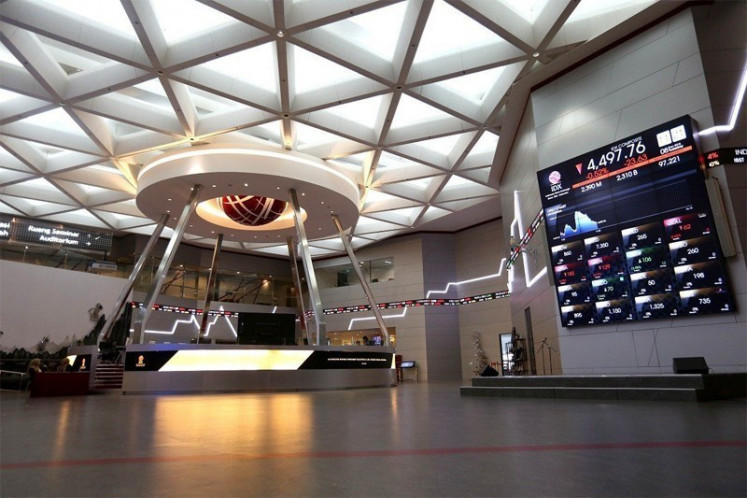Popular Reads
Top Results
Can't find what you're looking for?
View all search resultsPopular Reads
Top Results
Can't find what you're looking for?
View all search resultsINKUD, Lestari Pasifik to build 616 bio-ethanol plants
PT INKUD Exchange signed a memorandum of understanding (MoU) on Monday with Malaysian biotechnology firm Lestari Pasifik Berhad to establish a joint venture aiming to set up 616 bio-refinery factories to process oil palm waste into bio-ethanol in Indonesia and Malaysia over the next five years
Change text size
Gift Premium Articles
to Anyone
P
T INKUD Exchange signed a memorandum of understanding (MoU) on Monday with Malaysian biotechnology firm Lestari Pasifik Berhad to establish a joint venture aiming to set up 616 bio-refinery factories to process oil palm waste into bio-ethanol in Indonesia and Malaysia over the next five years.
Following the agreement, INKUD Exchange — a joint venture between the Federation of Indonesia Rural Cooperatives (Inkud), green advocates and Lestari Pasifik Berhad will set up a pilot project in Sumatra.
“We will survey any possible areas in Sumatra; probably in North Sumatra, Riau or West Sumatra. We hope to have established a factory by the end of this year,” Inkud chairman Herman Y.L. Wutun said.
Herman said that Inkud, through PT INKUD Exchange, agreed to collaborate with Lestari Pasifik because it had secured an exclusive license for a bio-ethanol production system by creating a joint venture collaboration with Russian technology company Arter Group.
Lestari Pasifik’s scientific advisor Gurmit Singh said that large oil palm plantations in Malaysia and Indonesia, which currently reach almost 12 million hectares in total area and produce 60 million tons of oil palm empty fruit bunches per year, offered opportunities for bio-fuel production to further substitute consumption of fossil fuels.
Bio-ethanol is usually mixed up to 85 percent with gasoline.
Singh said a bio-refinery factory, which operates 20 hours a day, will process 12 tons of waste from 60 tons of empty fruit bunches per hour. The factory can produce 130 liters of bio-ethanol from one ton of waste.
The completion of 616 factories in 2016, according to Lestari Pasifik vice president for strategy and planning, Saravanan Rasaratnam, will produce up to 3.71 billion liters of bio-ethanol annually.
INKUD Exchange and Lestari Pasifik agreed to locate 316 of the 616 planned factories in Indonesia, which Herman said relates to the number of palm oil mills in the country.
“We will talk to owners of the 316 mills to let us build the factories next to their mills. If the factories are far from the mills, we will have to pay delivery costs which reach up to Rp 150,000 [US$16.86] per 8 tons of empty fruit bunches,” he said.
A factory would cost 3.5 million Malaysian ringgit ($1.13 million), Lestari Pasifik CEO Clement Tan said, adding that mill owners would also benefit from the sales of bio-ethanol in return for permission to use oil palm waste and set-up plants.
“We will not buy the oil palm waste. We give them part of what we have from the bio-ethanol sales,” Tan said. China will be the primary market for bio-ethanol produced by the factories. However, Lestari Pasifik plans to allocate 20 percent of bio-ethanol production for local consumption.
“We are looking to giving back bio-ethanol to the rural areas which cannot access petrol. It may be 20 percent [output] going back to locals and 80 percent for export,” Tan said. (rcf)










